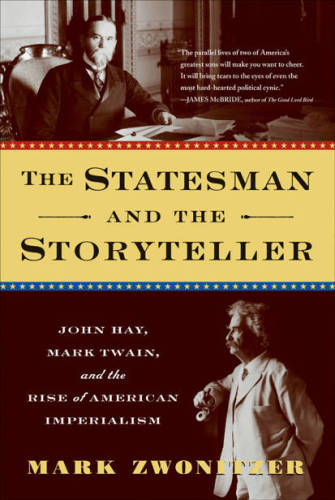
The Statesman and the Storyteller
John Hay, Mark Twain, and the Rise of American Imperialism
کتاب های مرتبط
- اطلاعات
- نقد و بررسی
- دیدگاه کاربران
نقد و بررسی

February 1, 2016
Documentarian Zwonitzer examines the split in an otherwise warm acquaintance between John Hay—an aide to Abraham Lincoln before becoming his secretary of state—and Samuel Clemens (aka Mark Twain), in this puzzlingly conceived account. The relationship between the two cooled around 1900 over America’s imperialist war in the Philippines, which Hay, as senior American statesman, helped direct for presidents McKinley and Theodore Roosevelt. Clemens concluded that the U.S. had gone too far in trying to defeat the Philippine rebels and went public with his criticism. Unfortunately, that’s weak scaffolding for a book, and as winningly as Zwonitzer unfolds the tale, it’s really a parallel biography of two men whose lives scarcely interacted in significant ways. Given Zwonitzer’s interest in the Spanish-American War, his focus should have been on Hay, who has recently been the subject of John Taliaferro’s fine biography All the Great Prizes. Clemens, while brilliantly described, seems an afterthought and incidental to the main action. What Zwonitzer accomplishes is adding novelistic color to his rendering of both men in their years of friendship. Zwonitzer makes all of his subjects here spring alive, and the book is a delightful read, even if the central conceit doesn’t fully work. Agent: Philippa Brophy, Sterling Lord Literistic.

February 1, 2016
Zwonitzer (coauthor, Will You Miss Me When I'm Gone?) presents, in a lengthy narrative framework, little-known facts about two relatively well-known men--John Hay, ambassador to the UK and subsequently secretary of state, and Mark Twain, author and cultural critic--focusing on the last years of their lives, 1895-1905. On a friendly basis through occasional correspondence for 38 years, the two men lived parallel lives that rarely intersected physically, despite Twain's onetime offers to partner and travel with Hay. Even when both resided in London during Hay's period as ambassador, they maintained their distance, reflecting their opposing roles in society, one as an official representative and the other as a professional contrarian. Differing in personality (though both originally from the frontier Midwest) and viewpoint (especially after America's expansion in the 20th century), they and their families combatted recurrent physical ailments, which the author details in depth. VERDICT Readers will appreciate learning about the contextualized experiences of these exemplars of the literary and diplomatic classes of their time. Those further interested in America's international military and commercial roles would also benefit from Philip McFarland's Mark Twain and the Colonel.--Frederick J. Augustyn Jr., Lib. of Congress, Washington, DC
Copyright 2016 Library Journal, LLC Used with permission.

January 15, 2016
American politics revealed through the lives of two indelible figures. Documentary film producer and writer Zwonitzer (co-author: Will You Miss Me When I'm Gone?: The Carter Family and Their Legacy in American Music, 2002) plies his considerable talent at storytelling in this vivid dual biography of statesman John Hay (1838-1905) and 19th-century America's most famous writer, Mark Twain (1835-1910). The author's choice of these two men seems somewhat arbitrary: although both grew up in "remote and brutish Mississippi River towns," their relationship "was not one of great intimacy and was even a tad distant." After they met in the 1860s, they rarely saw one another. Temperamentally, Zwonitzer notes, they were "very different sorts of men." Hay was refined and diplomatic and had married into significant wealth. Twain, volatile and impetuous, was dogged by debt. They differed politically, too: Hay, who had been Lincoln's secretary, was "a Republican in the original party sense: a defender of government by educated and accomplished white men"; Twain "was a small-d-democrat and skeptical that anybody in power would long remain interested in the common good." From 1895 to 1905, Hay was involved most directly in the country's transformation as ambassador to England and secretary of state under William McKinley and, after McKinley's assassination, Theodore Roosevelt. In 1898, America engaged in war with Spain over Cuba; Spain capitulated after a few weeks, ceding the Philippines to the U.S. The annexation of Hawaii soon followed. Hay's negotiations with British and European leaders put him in the center of world affairs. But "Hay needed no office in order to wield influence," his friend Henry Adams commented. "For him, influence lay about the streets, waiting for him to stoop to it." Because Twain's waning years are well-known--tireless efforts to earn money, sadness over the deaths of two daughters and his wife--Hay emerges as the fresher figure in Zwonitzer's pages. A brisk and entertaining historical narrative.
COPYRIGHT(2016) Kirkus Reviews, ALL RIGHTS RESERVED.

























دیدگاه کاربران